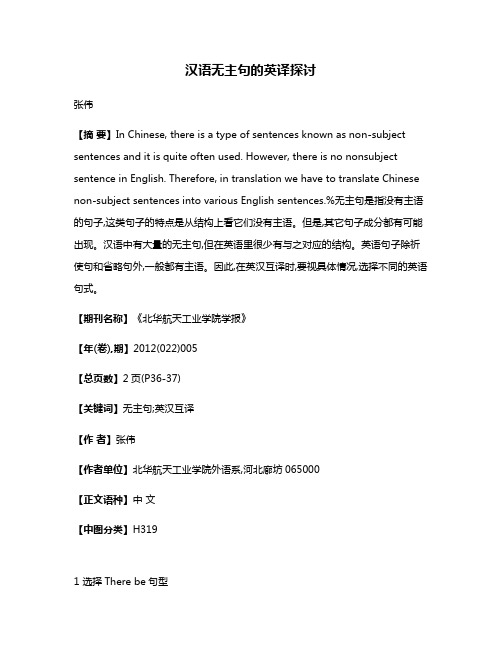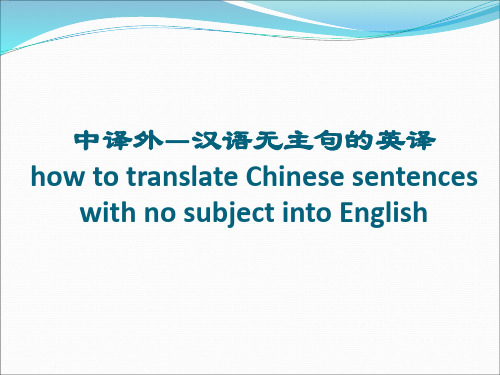7-汉语无主句的英译
汉语无主句的英译探讨

汉语无主句的英译探讨张伟【摘要】In Chinese, there is a type of sentences known as non-subject sentences and it is quite often used. However, there is no nonsubject sentence in English. Therefore, in translation we have to translate Chinese non-subject sentences into various English sentences.%无主句是指没有主语的句子,这类句子的特点是从结构上看它们没有主语。
但是,其它句子成分都有可能出现。
汉语中有大量的无主句,但在英语里很少有与之对应的结构。
英语句子除祈使句和省略句外,一般都有主语。
因此,在英汉互译时,要视具体情况,选择不同的英语句式。
【期刊名称】《北华航天工业学院学报》【年(卷),期】2012(022)005【总页数】2页(P36-37)【关键词】无主句;英汉互译【作者】张伟【作者单位】北华航天工业学院外语系,河北廊坊065000【正文语种】中文【中图分类】H3191 选择There be句型有的无主句表达一种事实,尤其科技文章中常出现无主句。
翻译时采用there be句型把所述存在物或情况用作英语句子的真实主语。
例:汉语:毫无疑问,到今年底将按预期生产出多达两倍的电子产品。
英译:There is no doubt that by the end of this year as many electronic products will have been produced as expected.汉语:抽象的数学应用于种类繁多的问题,这是不可忽略的。
英译:There should be no neglecting the application of such abstract methematics to so great a variety of problems.2 选择分裂句式有些汉语无主句用来强调某些语义成分,比如用“正是”、“就是”、“只有当/在…”等词语引导。
特殊句型翻译

She has a teacher who comes from France.
当兼语式的第一个动词式是“批评”、“表扬”、“埋 怨”、“责备”等时,通常可将第二个动词用英语中表 示原因的状语从句来表达。
采用英语中“主语+谓语+宾语+宾语补足语”句型, 其中宾补可由名词、形容词、副词、介词短语或非谓 语动词充当,如:
(1)我希望你早日康复。 I hope to see you well soon.
(2)我们发现这故事很有教育意义。 We found the story very instructive.
用英语的动词的习惯用法表达 当汉语兼语句的第一个动词有“使动”含义时,可利
用英语中含有“致使”“促成”意义的动词来翻译, 如: (1)她的做法让他气愤不已。 Her behavior enraged him.
(2)这一暴行使全世界公众舆论感到震惊。 This outrage shocked the world opinion.
前后谓语表示同时关系或先后关系。可将其中一个动词 用分词短语译出来或译成两个谓语动词,用“and”连接, 如:
(1)她从口袋里掏出钥匙把门打开。 Taking a key out of his pocket , he opened the door.
(2)他转身看见一辆救护车开了过来。 Turning around, she saw an ambulance driving up.
三、汉语兼语句
汉语兼语句就是由前一个动词的宾语兼作后一 个动词的主语所组成的句子结构,如“我请他 们吃饭”。汉语的兼语句在结构上类似英语的 复合宾语,英译时可以适当地借鉴英语中复合 宾语的表现方式,即SVOC的模式。V和OC之 间形成动宾关系,而O和C之间形成主谓关系, 如何使用O要依据V的性质来决定,如带to和 不带to的不定式,短语等。
大学英语翻译技巧 7

第七单元句子的翻译(3)真实、虚拟条件句和否定句的翻译第一部分:英语中真实条件句和虚拟条件句的翻译一. 真实条件句的翻译在真实条件句中,说话人或把条件视为事实,或仅仅提出条件,不作任何主观设想,如果条件实现,主句内容便成为事实;如果条件不实现,结果也就不会发生。
译成分句即可。
例如:·If the weather is not good, I shall stay at home.如果天气不好,我将呆在家里。
·Unless the weather is good, I shall stay at home.如果天气不好,我将呆在家里。
·I will stay at home providing /provided/ on condition(that) the weather is not good.假如天气不好,我就呆在家里。
·I will stay at home only if the weather is not good.如果天气不好,我只好呆在家里。
·I will stay at home if only the weather is not good.只要天气不好,我就呆在家里。
·Given bad weather, I will stay at home.假使天气不好,我就呆在家里。
·Suppose we can’t get the necessary equipment, what shall we do?假设我们弄不到必要的设备,那我们怎么办?·As long as we don’t lose heart, we’ll find a way to overcome the difficulty.只要我们不灰心,我们就能找到克服困难的方法。
·Granted that this is true, what conclusion can you draw?就算这是实际情况,你又能得出什么结论呢?·Send us a message in case you have any difficulty.万一有什么困难请给我们一个信。
句法视角下的汉语无主句英译策略探析

句法视角下的汉语无主句英译策略探析本文旨在通过对句法视角下的汉语无主句英译策略的分析,探讨汉语无主句英译中存在的问题,并且提出相应的解决方案,以期达到英译更加准确、流畅的目的。
汉语无主句是汉语句子结构中的一种特殊类型,它没有谓语动词和句子的主语,具有明确的主旨,可以简洁地表达某种行为或思想。
然而,汉语无主句在英译过程中存在着一定的难点,其中最主要的有句法上的挑战、文化差异性的问题以及汉语表达的认知特点。
首先,汉语无主句的结构和英语句子的结构是不一样的,在汉语无主句英译时,往往不能完全照搬原文的句子结构,这就要求译者在翻译过程中要对汉语句子语义进行把握,并且调整句子结构,以达到英文表达的自然、流畅。
其次,由于来自不同文化背景的原因,汉语无主句的主旨信息一般只能在原文中推断出来,而英语句子必须明确表达主旨,因此,译者需要根据汉语无主句的语义特点,并结合原文中的对照信息以及上下文,合理调整英文句子的主语,以实现主旨的准确表达。
最后,汉语无主句倾向于用虚语,即以其他语言中所不存在的名词代替主语,例如以“人们”来代替“我们”,而英语中则缺乏这种表达方式,因此,译者在汉语无主句英译过程中需要根据上下文对汉语的认知特点,以及汉语的语义特点,把虚语转换为实语,以确保英文表达的准确性。
从上述探讨可以得出,汉语无主句英译的难点主要集中在句法上的挑战、文化差异性的问题和汉语表达的认知特点这三个方面。
因此,译者在进行英译汉语无主句时,需要对原文语义进行充分理解,结合原文的语境,正确调整句子结构,将原文语义表达准确地转换到英语中,以达到英译更加准确、流畅的目的。
此外,培养正确的英译习惯也是非常重要的,一个良好的英译习惯会帮助译者更加准确地理解原文,并在英译过程中更轻松的应用英语语法规范。
综上所述,汉语无主句英译是一个艰巨的任务,译者需要通过对句法视角下的汉语无主句英译策略的分析,熟悉英语语法规范,结合上下文调整句子结构,正确地理解汉语无主句的语义,以便将原文信息准确地表达出来。
汉语无主句的翻译(讲义)

1.13无主句的翻译(P46-50)汉语里有众多的无主句,而英语里通常都用完整的句子。
翻译这类句子时,要根据不同的情况,有时要添加主语,有时要变换句型和句式。
1.译成被动句(1)译成原宾语做主语的被动句--- “by”引出做某事的人或东西,或介绍做某事的方法。
---“By”introduces what (or how) something is done by or method by which something is done.---为了确保乘客的人身安全,必须检查乘客随身携带的每一件行李。
---Each piece of luggage carried by the passengers must be examined to makesure of their safety.(2)译成“It +动词被动语态+(状语)+连接代词/连接副词+to do”或“It +动词被动语态+连接代词/连接副词引导的名词性从句”---是否在这里修建水坝还没有决定。
---It is not yet decided whether to build the dam here.---下次会议将讨论我们是否接受他的报价。
---It will be discussed at the next meeting whether we should accept his offer or not.---尚未决定何时交货。
---It’s not been settled yet when the goods should be delivered.(3)译成”There + 动词被动语态+主语+(状语)”译成引导词There后面使用及物动词被动语态,再接主语这样一种特殊形式。
---在离岸不远的地方可以找到那条船的一些线索。
---There can be found some remains of the wrecked ship near the shore.---世界上已经建造了一些了不起的机器来从受控核聚变中发电。
7-汉语无主句的英译

II. 增加主语
2. 增加 one, you, we, they, people 等作主语 1) 从太空观察地球,可以更深入地了解地球的构造,探 明地球的资源,预测地震、洪水、飓风、火山爆发、 海啸和其他自然灾害,可以保护人们的生命和财产。 探明资源(=勘探资源) explore resources 地震、洪水、飓风、火山爆发、海啸 earthquakes, floods, hurricanes, volcanic eruptions, tsunamis([su'nɑ:mi]) 自然灾害 natural disasters/calamities 注:catastrophe 大灾难, 程度比 disaster/calamity 深, 如 the catastrophe of a worldwide conflict
1) 人们的看法是旅游业将有助于促进中国人民和其 他国家人民之间的相互了解和友谊,并将有利于 文化、科学、技术方面的交流。还会有助于国家 增加收入。 The development of tourism, it is believed, will help promote mutual understanding and friendship between the peoples of China and other countries, and facilitate exchanges in the fields of culture, science and technology. Tourism also helps increase national revenue.
汉英翻译技巧无主句的翻译18页

二.采用“There+be…”,“It/one+be…+to…”等结 构
汉语中的某些格言、经验,或带有哲理的无主句,翻 译时一般都采用这类结构。例如:
(1)没有顺利,无所谓困难;没有困难,也无所谓顺利。
Without facility, there would be no difficulty; without difficulty, there would also be no facility.
(1)本剧场内禁止吸烟。
Smoking is not allowed in the theatre. (2) 发现了错误,一定要改正。
Wrongs must be righted when they are discovered.
(3) 必须保证八小时睡眠。
Eight hours’ sleep must be gu到老。
One is never too old to learn.
(3) 你忘记一句古话了吗:活到老,学到老。 何况你并不老。
Have you ever forgotten the old saying: one is never too old to learn. In any case, you’re not old at all.
五.选用适当的名词或代词补出主语
汉语无主句的英译,除上述几种方法外,还可以根据 上下文选用适当的名词或代词(包括人称代词和否定代
词)补出主语,构成一个完整的句子。例如:
(1)弄得不好,就会前功尽弃。
If things are not properly handled, our labor will be totally lost.
无主句的英译

汉译英汉语无主句的英译1. 通常六点半开灯。
The lights are usually turned on at 6:30.2. 继续改善居民住房条件。
Housing conditions should be continuously improved.3. 处处有热心人。
There are warm-hearted people everywhere.4. 到什么山上唱什么歌。
Sing different songs on different mountains.5. 打得赢就打,打不赢就走。
Fight when you can win, move away when you cannot.6. 要在工作中获得成功,就必须有耐心。
One must be patient if one wants to win success in work.7. 墙上挂了一些画。
Some pictures were hung on the wall.什么叫无主句?▪在汉语中,只有谓语而没有主语部分的句子叫无主句(非主谓句)。
▪但无主句,并不是省略了主语的句子,汉语中省去主语的句子属于“省略句”。
▪汉语无主句本身是完整的,不必补上什么,但意义一目了然。
▪汉语省略句由于一定的语言环境省略了某个成分,需要时可以准确地补出来。
▪例如,对话时,一个人说“别玩火”!▪这个祈使句是省略主语的主谓句,可以补出主语“你”或“你们”。
▪而公共场所所写的“ 禁止烟火!”(No burning! 或No Smoking!)▪这个句子本身是完整的,不必补出什么成分。
汉语中存在着大量的无主句。
据相关统计,汉语中所谓主谓句和非主谓句各占一半。
文言文中主谓句还要少。
▪可是在英语里,句子一般都要有主语,没有主语是例外。
汉语存在大量无主句的成因:▪英语重形合,属语法型,语法形式是显性的,句子有严谨的主谓结构。
而汉语重意合,属语义型,语法形式是隐性的,句子注重意念连贯,不求结构完整。
- 1、下载文档前请自行甄别文档内容的完整性,平台不提供额外的编辑、内容补充、找答案等附加服务。
- 2、"仅部分预览"的文档,不可在线预览部分如存在完整性等问题,可反馈申请退款(可完整预览的文档不适用该条件!)。
- 3、如文档侵犯您的权益,请联系客服反馈,我们会尽快为您处理(人工客服工作时间:9:00-18:30)。
after the exposition.
3) 弄得不好,就会前功尽弃。 前功尽弃 to waste all the previous efforts All labour is lost. All one's labour has been in vain. If things are not properly handled, all our work so far/till now will be waing the Earth from space, we can further understand its structure, explore its resources and predict earthquakes, floods, hurricanes, volcanic eruptions, tsunamis and other natural calamities, so that we can better protect our human lives and property.
3) 可以说,这个期间我国财富有了巨额增加,整个国 民经济上了一个新的台阶。 It can be said that during this period China‟s wealth expanded considerably, and the national economy as a whole was raised to a new level. ……China has accumulated considerable wealth, with its whole national economy rising to/reaching a new level.
II. 增加主语
1. 根据上下文增加主语 1) 人们的看法是旅游业将有助于促进中国人民和其 他国家人民之间的相互了解和友谊,并将有利于 文化、科学、技术方面的交流。还会有助于国家 增加收入。 促进了解 promote/enhance understanding 增进友谊 promote/strengthen friendship 促进交流 promote/facilitate exchanges 收入: revenue 国家的收入、税收 profit 企业收入 income、earnings 企业、个人收入
I、翻译成英语被动式
2. 直接被动 1) 应当承认,奥运会是当今世界惟一属于全世界普通 百姓的节日。 承认 recognize 作“承认”解时,系书面用词,主要指合 法的或外交、官方的承认,也指公认 admit one‟s mistakes/guilt 强调因外力或良心驱使或 经判断而明确承认,多含不情愿或被迫意味 acknowledge [中] 侧重指公开承认,以及大众承认 be acknowledged as 公认为 普通百姓 common/ordinary people
3) 可以说,这个期间我国财富有了巨额增加,整个国 民经济上了一个新的台阶。 增加财富 accumulate/expand/increase wealth boost price 提高价格 国民经济 national economy 上新台阶 rise to a new level raise…to a new level reach a new level reach a higher stage of development
4) 优先发展科技教育。
优先 to give priority to
The priority should be given to the development of
science, technology and education.
5) 以公路建设为重点,加强铁路、机场、天然气管道 干线的建设。 以…为重点,强调 emphasize,stress to lay/place/put emphasis on/upon to lay/place/put stress on/upon Emphasis should be placed on highway construction while more efforts will be made in building railways, airports and gas pipelines.
总结 据了解/据报道…… It has been learned/reported that…… 据估计…… It is estimated that…… 据说/据信/据预测…… It is said/believed/predicted that…… 可以想象/断言/断定/肯定…… It can be imagined/asserted/decided/affirmed that…… 必须指出…… It must be pointed that…… 人们有时会问…… It is sometimes asked that……
1) 应当承认,奥运会是当今世界惟一属于全世界普通
百姓的节日。
The Olympic Games should be recognized to be the
only festival for common/ordinary people of the world today. It should be recognized that the Olympic Games is the only festival for common/ordinary people of the present-day world.
2) 看完展览之后,也许还有时间进了书店。 展览 exposition (较大规模的)博览会, 展览会 Eg: Shanghai Expo 上海世博会 show (小规模的)展示会,展览会
I might still have time to visit bookstores after the exposition.
2) 发现了错误,一定要改正。 Errors must be corrected when discovered. 3) 进一步深化国有企业改革。 国有企业 state-owned enterprises 私企 private enterprises 外企 foreign-funded/invested/owned enterprises The reform of state-owned enterprises will be further carried out/deepened.
2) 已经证明,对促进中国人民和世界其他地方人民的 交流来说,这是最好的途径之一。 促进交流 promote/facilitate exchange(s) 途径 way/approach It has been proved that this is one of the best ways/approaches to promote the exchange between the peoples of China and other parts of the world.
1) 人们的看法是旅游业将有助于促进中国人民和其 他国家人民之间的相互了解和友谊,并将有利于 文化、科学、技术方面的交流。还会有助于国家 增加收入。 The development of tourism, it is believed, will help promote mutual understanding and friendship between the peoples of China and other countries, and facilitate exchanges in the fields of culture, science and technology. Tourism also helps increase national revenue.
2. 增加主语 根据上下文增加主语 增加 one, you, we, they, people 等作主语
I、翻译成英语被动式
1. 采用 It is v-ed that 从句形式 1) 直升机飞抵映秀镇上空时,可以看见整个镇子几乎 变成了一片废墟。 直升机 helicopter 飞抵…上空 arrive above the town/city of fly/pass over the town/city of 废墟 ruins shambles 遭严重破坏的地方;凌乱的景象 wasteland [u, c] n. 不毛之地,荒地
1) 直升机飞抵映秀镇上空时,可以看见整个镇子几乎 变成了一片废墟。 When the helicopter arrived above the town of Yingxiu, it could be seen that the whole town was almost reduced to ruins/shambles. reduce to…, reduce…to…(使)沦为 When the helicopter flew/passed over the town of Yingxiu, it could be seen that the whole town was almost turned into ruins/shambles.
II. 增加主语
2. 增加 one, you, we, they, people 等作主语 1) 从太空观察地球,可以更深入地了解地球的构造,探 明地球的资源,预测地震、洪水、飓风、火山爆发、 海啸和其他自然灾害,可以保护人们的生命和财产。 探明资源(=勘探资源) explore resources 地震、洪水、飓风、火山爆发、海啸 earthquakes, floods, hurricanes, volcanic eruptions, tsunamis([su'nɑ:mi]) 自然灾害 natural disasters/calamities 注:catastrophe 大灾难, 程度比 disaster/calamity 深, 如 the catastrophe of a worldwide conflict
